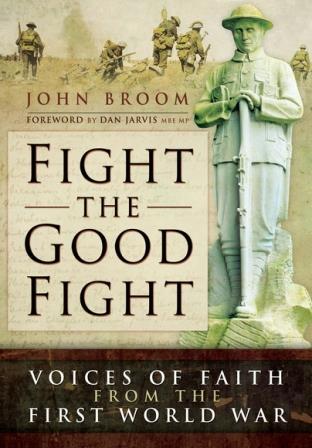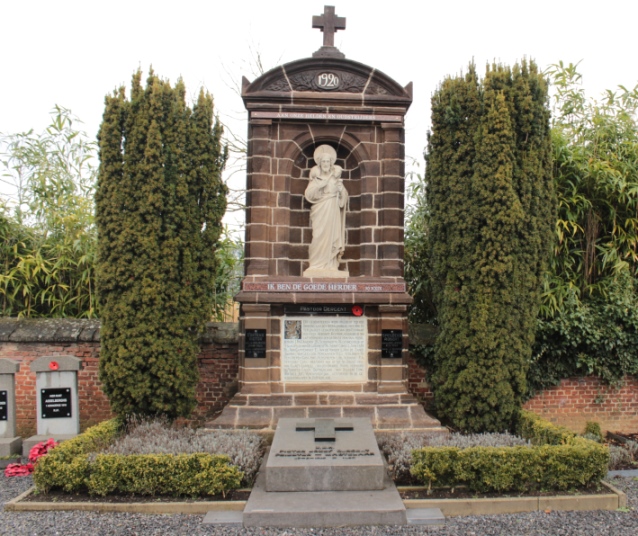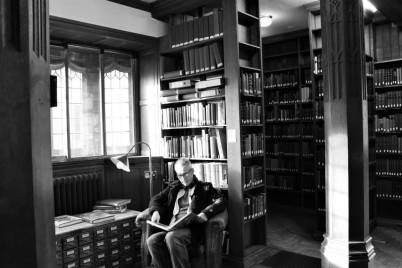
With the First World War 100th anniversary commemorations ongoing, I’m welcoming John Broom, author of Fight the Good Fight: Voice of Faith from the First World War to Essex & Suffolk Surnames. His book examines the way that faith and war combine – how one person’s faith might prompt them to seek after peace, whilst another’s inspires gung-ho nationalism. John looks at the experiences of people from many countries involved with the First World War, and uncovers previously untold stories of belief and bravery in the face of unparalleled destruction and despair.
His second book, about faith and the Second World War, will be out in April 2016.
So I asked him a few questions…..
Have you written before, or had any aspirations to write during your teaching career?
Before the publication of Fight the Good Fight, my only foray into the published word was an article in Aspects of Barnsley 7, published by the Wharncliffe Press, a forerunner of Pen and Sword. I had trawled through the log books of the school I was teaching in to produce an account of how the staff and pupils had adapted to the demands of the Second World War. However I had always wanted to write a book, but never felt I had enough grip on any particular one subject to produce something worthwhile, before the area of war and Christianity presented itself to me.
What drew you to the subject of war and Christianity?
My father was quite a bit older than me, and when he died in 1991 I unfortunately knew little of his experiences in the Second World War, beyond the fact that he had served in the Royal Army Medical Corps with the Desert Rats. This remained the case until 2006, when a chance discovery of over 170 letters he had written between 1940 and 1946 came into my possession. I was given the opportunity to drive to Colchester to collect a carrier bag full of my father’s papers, or they would be destroyed.
That decision was one of the most important of my life. My father had a devout Christian faith and this was a very strong theme throughout the letters. I wanted to find out more about the culture surrounding my father as a young man, so undertook an MA in History with the Open University before transferring to a PhD under the guidance of Professor Michael Snape, now of the University of Durham.
For the past decade, the links between Christianity and the great wars of the twentieth century has fascinated me. It is all around us; on war memorials, in the language of commemoration and in the accounts people left. It is so commonplace that it is easy to overlook. Therefore I wanted my book to highlight this particular aspect of the war.
How did you select the people to cover in the book?
I had been asked by the Bible Society to conduct some research for their First World War website, and I came across many of the people through that work. The brief was to find case studies of people whose Christian faith directed their war experience. Some were already quite well known, such as Edith Cavell, the Norfolk nurse shot as a spy by the Germans, and Noel Chavasse, the only man to be awarded two VCs during the first war. Others I found through reading around the subject and visiting archives and churches around the country. Many of these accounts were not in the public domain before being drawn together in the book. I was attracted to people who experienced their faith in a range of ways, from the Home Front to the Western Front, and from army chaplaincy and the prisoner of war experience to conscientious objection. I wanted to reflect the range of faith and range of reactions, and people for whom I felt a connection to their past, and felt I could pass that connection on to my readers.
Two people I came across whom I found particularly engaging were Francis Gleeson and Pieter-Jozef Dergent. Francis was a Catholic priest who served as a chaplain to the Royal Munster Fusiliers. He cared deeply for his men, writing heartfelt letters to their families when he had the sad task of informing them of their loved ones’ deaths. The strain on him was unimaginable, but he bore it with a simple and honest integrity which I hope will move others as it has moved me.

Dergent was a Belgian priest serving a small rural parish in August 1914 during the German invasion of Belgium. He disobeyed the curfew in order to take wounded civilians to a hospital for treatment. For this he was publicly tortured and humiliated outside of the church in the town of Aarschot. He was repeatedly told to renounce his faith but refused to do so. He was eventually shot and his body thrown in a river. It was later recovered downstream, and his case became widely reported in the press as an example of German atrocities in Belgium. What appealed to me about him was the humility of his manner and the regard in which he was held by his flock, as well as his extraordinary personal courage and integrity. In addition, there is no account of his life available in English, and none currently in print in any language.

And there’s a connection with Suffolk in your book, too
Harry Wisbey was born in Nayland, Suffolk, in 1876. He had served as a soldier in the Boer War before being accepted as an Army Scripture Reader in 1900. His role was to travel with a regiment both on home and active service, distributing gospels and testaments, and talking with the men about Christ. He was attached to the 2nd Suffolk Regiment, which was sent as part of the British Expeditionary Force to Belgium in the autumn of 1914. There he witnessed the Retreat from Mons and the distress of the Belgian refugees. As he held no official army position, merely being allowed to accompany them, he received no rations or shelter, and had to rely on the kindness and goodwill of the soldiers to survive. His faith was very intense, and he was fortunate to escape with his life, and with the precious diary he had kept recording his experiences.
What surprised or shocked you?
One thing that was brought home to me was the fragile nature of mortality. I had not heard of many of these people before starting my research, and found that some of them were quite prominent or well-reported in their time. Some, like Hon Edith Gell, had written and campaigned extensively for a range of causes, yet no account of her life had been made. For me, history is about much more than facts and numbers, even more than arguments and debates. It is about the imprint each one of us leaves on the world. Whatever one’s beliefs about an afterlife, history is the medium by which people from the past can live on in our thoughts, and in our collective consciousness. I felt that my appreciation of what history was all about was given an extra dimension through researching and writing the book.
Are there any historians you admire?
For me the art of good history is not just the academic credibility, but the ability to communicate knowledge and develop understanding in an engaging manner. A number of TV historians such as Janina Ramirez, Alice Roberts and Kate Williams, have started to do this without some of the over-theatricality of the previous generation. Apart from Michael Snape, who is the county’s leading authority on war and religion, I have enjoyed the books of Alan Allport on the culture of the British Army in the Second World War, and on the demobilisation process. But really I can soak up anything. I’m rather too keen on acquiring books, as my wife would attest, and will engage with anything that sheds new light on the past in an honest and accessible way.

Where do you like to write?
I have a very busy life, working full time and running competitively for a club, as well as my various history projects, which include PhD research as well as the books. Therefore I write in any small space I can find. Over breakfast, in my car during a lunch break at work, in the evenings. I was fortunate enough to book a ‘retreat’ holiday for four days to finalise the book, so I had a distraction-free time in rural Shropshire where I could concentrate fully on the process. But most of my writing is done in short snatches between life’s other demands.
What are you up to next?
The next book is a similar collection, but this time of Second World War studies. I have a strong personal connection to this book, as two of the studies are family members, and I have personally met and interviewed some of the other people in the book. It comes out in April 2016.
You can follow John Broom on Twitter @johnbroom1970 and visit his website, Faith in Wartime.
Buy Fight the Good Fight: Voices of Faith from the First World War direct from the publisher, Pen & Sword, or from Waterstones and Amazon. It is available in hardback and ebook formats.
Pre-order Fight the Good Fight: Voices of Faith from the Second World War from Waterstones and Amazon. Please email Pen & Sword to pre-order from them. It will be available in hardback and ebook formats.
